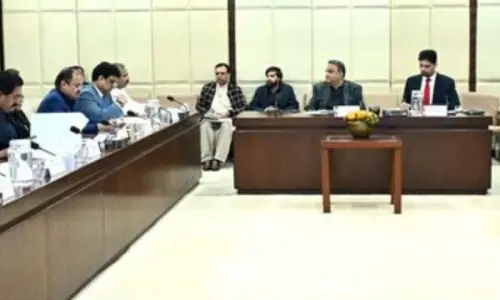Haider Bhai is cricket crazed. Cricket becomes a part of any and all conversations he is part of and sometimes it seems that he remembers his life around major cricket events using them as anchors to ground his own reality.
Haider Bhai is also the star of the documentary film 'Dreaming Taj Mahal' that has won multiple awards, most recently, the National Award 2012 in the category of Best Promotional Film for furthering love and peace across hostile borders. Meeting Haider Bhai, one might be surprised to learn of all this fame hidden behind his meek frame and friendly disposition.
Underneath the surface, he is a man full of philosophies of love. A preacher of co-existence, ordinary in every way but strangely flowing against the current and defying expectations in his beliefs.
And it is this spirit that has been captured by an Indian couple, director Nirmal Chander and his wife, Reena Mohan, in a documentary film about Haider Bhai and his burning desire to visit the Taj Mahal.
Haider Bhai, originally from a village in Chakwal, was working hard in Rawalpindi trying to make ends meet when he was assigned to a team of sports reporter covering the cricket series of 2006.
This film was shot in 2007 after Nirmal, an Indian director, got to know Haider Bhai, a driver for a rent-a-car company, during his tour to Pakistan while covering this cricket series as a sports reporter.
Nirmal narrates that of all the things he was impressed by in his experience in Pakistan, the hospitality, the warmth, and being treated as someone who has returned home in encounters on the streets, what stayed with him was Haider's dream to visit India and see the Taj Mahal for real.
"As a wish waiting to be fulfilled, it seemed innocuous, perhaps even naive. But the more I thought about it, the more I realized just how complex a challenge it would be to actually fulfil it," he contemplated, adding, "It has made me question, why is it so? Is it because he is a Muslim? or a Pakistani? or both? I realise he is even worse off– a common man, who doesn't count!"
Nirmal's fascination with the 'common man' results in him capturing what makes the every day for us. And indeed, the first experience of watching 'Dreaming Taj Mahal' leaves one wondering what is unique about it. Too much of it seems familiar and mundane.
Nirmal explains, "Through my films, I would like to create a space where ordinary people can express themselves... and through an appreciation of the everyday come to an understanding of the big universal questions of life."
The documentary itself follows Haider bhai as he goes home to his family in a village in Chakwal over Eid.
Haider Bhai explains the dangers in having Nirmal and his wife meet others in the village since they were foreigners after all, while simultaneously, the fact that they could communicate in similar languages made them one and develop camaraderie with Haider Bhai's family immediately.
Not to be taken as a paragon of love and positivity, Haider bhai displays his share of cynicism in the film.
He hates the government and is distrustful of its selfish motives, and is unhappy with traditions of jealousy, deceit and narrow mindedness he finds in fellow human beings.
But he simultaneously embraces and disseminates a larger message of common experience and interaction, both in words and through actions, and is convinced that this will bring about a positive change.
One example of this spirit was the fact that Haider bhai allowed two Indian film makers into his home. The insight into a Pakistani home in such a candid manner is new for Pakistan.
Nirmal and Reena developed a mutual trust that allowed them access to Haider Bhai's house and revealed a life style that is known, and yet remains hidden. Allowing this access is what made Haider Bhai unique.
Pakistanis and Indians are one people, let them travel across the border, he would say. And express his frustration at the artificial nature of the border that keeps him on one side, away from the other side.
In a more eloquent manner, Nirmal expressed the same sentiments deriding the state hostilities that become barriers for the people as well: " Why can't I get up one fine day, give race to my car and have breakfast at Amritsar, lunch at Lahore and dinner at Peshawar? And next day to Afghanistan to Iran and to...why can't I?"
Even though Haider Bhai has applied for a visa to India multiple times, it has never been accepted.
In a time when more and more Pakistanis and Indians are fighting for leaner visa controls, Haider Bhai's wish might perhaps not be so unimaginable. It is easy to hate a country, but not so easy to hate a person sitting right in front of you.
Nirmal expresses similar sentiments in his motivation behind this documentary: "I feel that now, more than ever before, it is important to make a film from the perspective of the common man who has been sidelined for all these many years and who actually holds the key to change... "
When asked what made the film win, Haider Bhai said it was the candid, truthful style in which it was filmed.
Nirmal, on the other hand, said that it was "the love and affection of Haider Bhai and his family that has touched one and all. I always say that a camera captures and records more than just sound and video!" he added.
And as this love captures the hearts of audiences around the world, it is time that Haider Bhai is finally rewarded with an opportunity to visit the Taj Mahal.

































